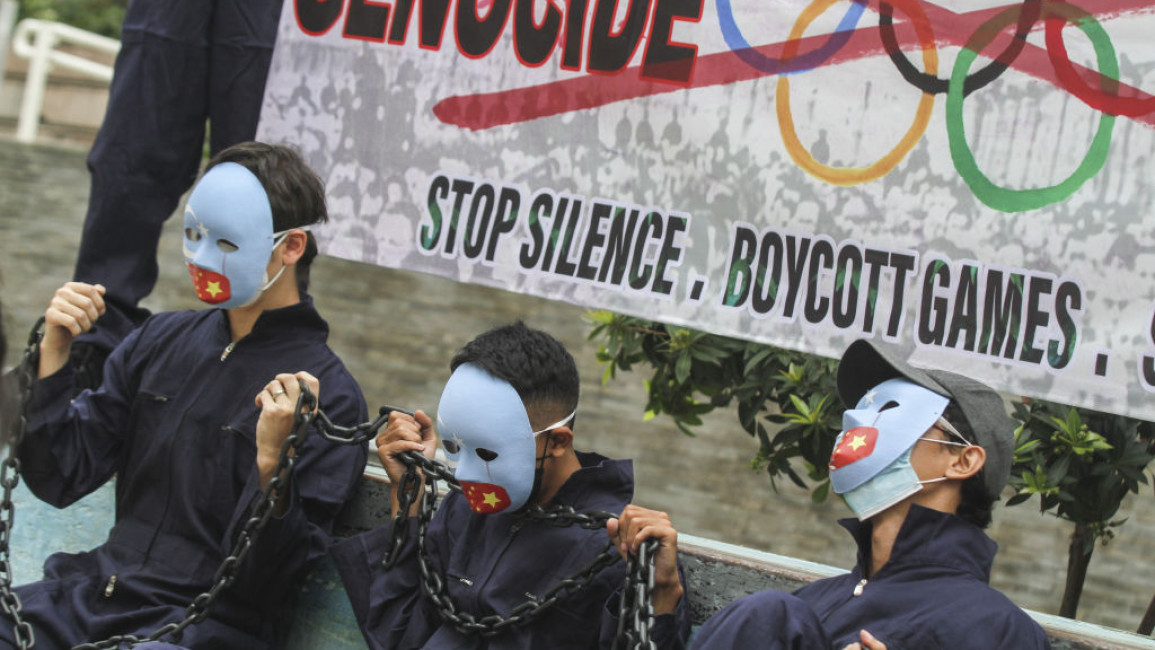Uyghur activists disappointed with IOC’s Olympics performance
As the 2020 Beijing Winter Olympics continue, Uyghur activists and advocates say they are disappointed with the choice of the host country, as well as with the International Olympic Committee and the games’ corporate sponsors.
The games are taking place in China despite years of documented human rights violations against China’s Uyghur community.
“China does not deserve this winter Olympics while genocide is happening in China,” Mustafa Aksu, a Washington-based Uyghur activist who grew up in the Xinjiang region of China, told The New Arab.
Over the past several years, a growing number of rights organisations and countries, including the United States, have used the term genocide to describe the forced labour, sterilisation, displacement and internment of ethnic Uyghurs from Xinjiang. This is an acceleration of a decades-long policy of forced assimilation in the region. In response, the US, the UK, Australia and several other major countries have joined a diplomatic boycott of the games.
Despite this increased awareness of China’s policies toward its mainly Muslim Turkic minorities, the IOC decided to move ahead with the Winter Olympics in Beijing, showing that hosting the Olympics does not necessarily lead to better human rights, as was hoped after the 2008 games in Beijing, Zumretay Arkin, programme and advocacy manager at the World Uyghur Congress, told The New Arab.
IOC President Thomas Bach has said that the Olympics should be politically neutral and that boycotts don’t work, only hurting athletes. From the planning stages until now, he hasn’t seen a reason to find a different host venue or to condemn China’s human rights record, leading critics to question the values of the committee.
“They could have said we’re not OK that you’re committing atrocities. Or we’ll take the games away,” Peter Irwin, senior program officer for advocacy and communications at the Uyghur Human Rights Project, told The New Arab. “When Thomas Bach says we won’t get involved in politics, do you need to see mass killing before you pull out? Where is the line? If crimes against humanity isn’t the line, where is it?”
“We’re asking the IOC to not be an enabler,” he added.
Irwin notes that though the games are not taking place in the Uyghur region, it is unclear if Olympics products have been made there, though many of them do have manufacturing contracts in Xinjiang, which would mean a high likelihood of forced labour.
Hosting the Olympics has allowed China to highlight a side of the country that doesn’t ring true to many in the Uyghur community who have suffered under its policies.
In the opening ceremony, the final Chinese torchbearer was a young Uyghur woman, a low-ranked cross-country skier who wasn’t well known, which raised the eyebrows of some activists.
“I think the Chinese government is trying to let the world know that Uyghurs are happy people. To me, it’s disgusting that China is using her as a political pawn," said Aksu.
He also noticed that when the torchbearer’s family was interviewed, the family’s men were conspicuously absent in the footage, making him wonder if the men of the family were in the camps. He was further incensed when her name was announced using its Chinese version, when her original Uyghur name is not difficult to pronounce.
“They are trying to cover everything up,” he said. He hopes, however, that athletes will feel free to talk about their experiences in Beijing once they return to their home countries.
Adding to the controversial decision for China to host the games is the general silence by the corporate sponsors, a group that arguably ranks just below the IOC in terms of power at the Olympics.
“They’re contributing hundreds of millions of dollars to the games. These sponsors have leverage,” said Irwin.
He says he has found more acknowledgement of the Uyghur issue by the broadcaster NBC. Last week, a sports analysis in USA Today praised NBC’s reporters for acknowledging the Uyghur situation, repeatedly using the term genocide, though emphasised that more should be done. This week, a range of other news outlets, including The Washington Post, gave a harsher critique of the network’s coverage, noting that since the opening of the games, the Uyghurs and other human rights issues in China have not been sufficiently addressed.
Even after these Olympics come to an end, questions remain over whether China will host the games again. After all, they did in the summer of 2008 amid outcry over their human rights record, and now they’ve built up even more Olympics infrastructure, and upcoming Olympics are planned for Paris and Los Angeles, both of which have already hosted the games.
“The IOC wants to get through these games so they’ll have smooth sailing in Paris and Los Angeles. They want to secure a few more Olympic host venues,” said Irwin.
Nurnisa Kurban, a Uyghur activist who works as a school principal in Los Angeles, and who protested the 2008 Olympics in Beijing along with other activists in California, says she will continue to raise awareness after the 2022 Olympics.
“This reminds me of a conversation I had with my Jewish friends, when the whole world stood by when the Holocaust took place,” Kurban told The New Arab, referring to the 1936 games in Berlin. “We will continue to educate people. As much as I’m disappointed, I’m also determined.”



